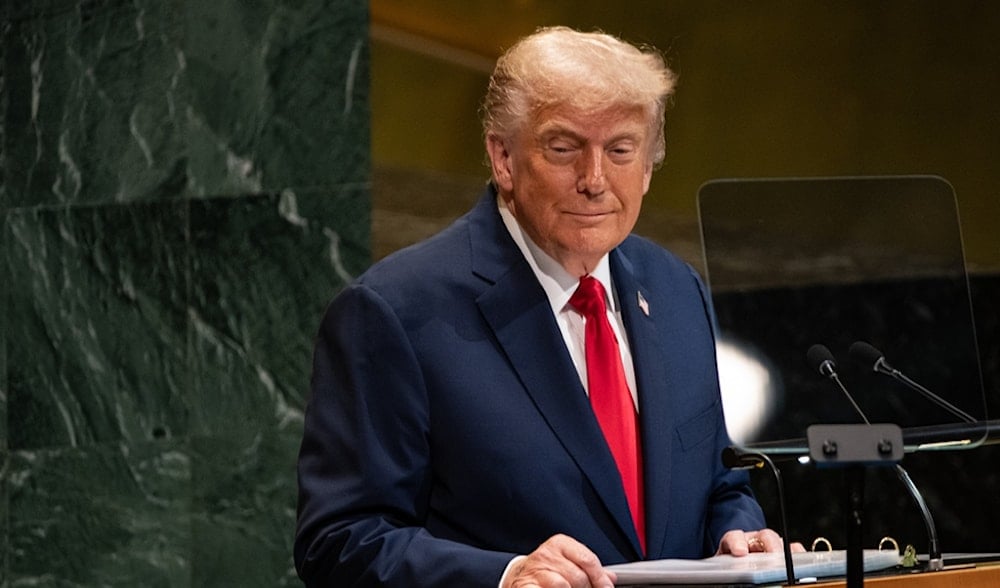Trump's tone shift on Ukraine may signal wish for US step back: NYT
US President Trump's shifted tone on Ukraine could have signaled a desire to reduce US involvement, drawing skepticism from allies and Republicans.
-

President Donald Trump addresses the 80th session of the United Nations General Assembly, Tuesday, Sept. 23, 2025, at U.N. headquarters. (AP)
US President Donald Trump, after swinging toward Russia regarding the conflict in Ukraine in a move that contradicted Biden's strategy, shifted his tone and declared that Ukraine could conquer lands Russia had regained throughout the three-year military operation.
Trump attributed the possibility to Ukraine's courage, ingenuity, and weapons supplied by NATO, alluding to confidence in military strength.
However, although the rhetoric echoes that previously used by his predecessor, who had been fiercely supporting Kiev, Trump's remarks signal a wish to step back from the conflict after repeated failures to achieve breakthroughs in negotiations, particularly with Russian President Vladimir Putin, the New York Times wrote.
BREAKING:
— Visegrád 24 (@visegrad24) September 23, 2025
Trump calls Russia a paper tiger and says he believes Ukraine, with the EU’s help, can take back all of Ukraine’s territory pic.twitter.com/ScFTZgmtzG
Contradictions in-office
As with many of Trump’s foreign policy pronouncements, his underlying position remains unclear. Former aides describe him as highly unpredictable, often guided by emotion and perceived slights rather than strategic calculation.
Even senior officials seemed surprised. On the same day Trump claimed Ukraine could win, Secretary of State Marco Rubio, who is also serving as national security advisor, reiterated the administration’s long-held stance that the conflict “cannot end militarily” and must be settled at the negotiating table.
Privately, a White House official said Trump was still open to targeting Moscow economically, not through sanctions, but tariffs, if Europe agreed to end Russian energy purchases.
Meanwhile, European partners were skeptical. British Prime Minister Keir Starmer stressed that only sustained US-led pressure had ever moved Putin, casting doubt on Trump’s suggestion of a reduced US role.
At home, Senator Mitch McConnell welcomed Trump’s recognition of Russia as the aggressor but warned that contradictory signals from his administration, including reduced military training and criticism of NATO, risk weakening US leverage.
“The commander in chief should not tolerate such freelancing,” McConnell said, urging stronger investment in transatlantic security.
Analysts had noted that Washington’s material support dropped significantly. According to Laura Cooper, a former Pentagon official, the Biden years saw US and European assistance to Ukraine split roughly evenly. Now, she said, “the US share of assistance has vanished,” leaving Europe to shoulder the fight but without the same deterrent weight.
Zelensky welcomes rhetorical shift
For Ukrainian President Volodymyr Zelensky, Trump’s new tone was a relief. After months of tension, Trump is no longer pressuring Kiev to surrender territory for peace, a move that would be politically devastating for Zelensky. Instead, Trump’s frustration seemed directed at Putin, which Zelensky hailed as a potential “game changer.”
Still, the Ukrainian leader left New York facing urgent needs: financing, technology, intelligence, and troops to sustain a war that has now lasted nearly as long as America’s role in World War II.
At the UN, Zelensky warned of the collapse of international law and said real security comes not from resolutions but from “friends and weapons.”
“Ukraine is only the first,” he said. “Russian drones are already flying over Europe, and Russian operations are spreading.”
Russia dismisses Trump's comments, affirms its strength
Meanwhile, Russia dismissed Trump's comments describing Moscow as a “paper tiger” and urging Ukraine to take advantage of Russia’s supposed economic weakness to reclaim occupied territory.
“Of course, President Trump heard Zelenskiy’s version of events. And apparently, at this point, this version is the reason for the assessment we heard,” Kremlin spokesperson Dmitry Peskov told RBC radio.
Addressing the situation on the battlefield, Peskov said the Russian army is advancing deliberately and cautiously in Ukraine.
Turning to the economy, Peskov rejected the idea that Russia is collapsing under sanctions. “Russia maintains its resilience. Russia maintains macroeconomic stability,” he said.
Peskov dismissed the “paper tiger” comparison outright: “Russia is a bear, not a tiger. And there is no such thing as a paper bear.”
Read more: Ukraine war: Trump envoy urges Europe to prepare for reduced US role

 4 Min Read
4 Min Read











